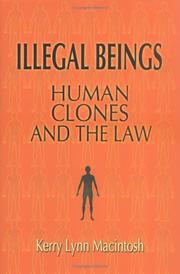| Listing 1 - 10 of 15 | << page >> |
Sort by
|

ISBN: 2020359030 9782020359030 Year: 1999 Publisher: Paris : Editions du Seuil,
Abstract | Keywords | Export | Availability | Bookmark
 Loading...
Loading...Choose an application
- Reference Manager
- EndNote
- RefWorks (Direct export to RefWorks)
Human cloning --- Clonage humain --- Moral and ethical aspects --- Human cloning - Moral and ethical aspects
Book
ISBN: 9798400627651 9798216062097 178684477X 1610696948 Year: 2015 Publisher: Santa Barbara, Calif. : New York : ABC-CLIO, LLC, Bloomsbury Publishing (US),
Abstract | Keywords | Export | Availability | Bookmark
 Loading...
Loading...Choose an application
- Reference Manager
- EndNote
- RefWorks (Direct export to RefWorks)
The history of cloning experiments dates back more than a century, but advances in technology in recent decades have multiplied the potential applications of cloning-and expanded the controversies surrounding these possibilities. Cloning: A Reference Handbook provides an accessible description of the development of plant and animal cloning from the early stages of human civilization to the present day and coherently covers the science and technology involved. It reviews the essential controversies that have arisen about cloning-particularly applications involving human DNA-as researchers have
Clones (Plants) --- Cloning. --- Extinct animals --- Human cloning. --- Pets --- Plant cuttings. --- Cloning. --- Cloning.
Book
ISBN: 1139854461 1107237890 1139840657 1139846213 1139410520 1139845381 1139843028 1283836386 113984184X 9781139845380 9781139840651 9781139410526 9781139843027 9781283836388 9781107669598 1107669596 9781107031852 1107031850 Year: 2013 Volume: 21 Publisher: Cambridge New York Cambridge University Press
Abstract | Keywords | Export | Availability | Bookmark
 Loading...
Loading...Choose an application
- Reference Manager
- EndNote
- RefWorks (Direct export to RefWorks)
Since Dolly the sheep was born, controversy has swirled around the technology of cloning. We recoil at the prospect of human copies, manufactured men and women, nefarious impersonators and resurrections of the dead. Such reactions have serious legal consequences: lawmakers have banned stem cell research along with the cloning of babies. But what if our minds have been playing tricks on us? What if everything we thought we knew about human cloning is rooted in intuition rather than fact? Human Cloning: Four Fallacies and their Legal Consequences is a rollicking ride through science, psychology and the law. Drawing on sources ranging from science fiction films to the Congressional Record, this book unmasks the role that psychological essentialism has played in bringing about cloning bans. It explains how hidden intuitions have caused conservatives and liberals to act contrary to their own most cherished ideals and values.
Human cloning --- Human beings --- Cloning --- Human reproductive technology --- Moral and ethical aspects --- Law and legislation --- Law --- General and Others
Book
ISBN: 2804018539 9782804018535 2930001569 Year: 2004 Volume: *19 Publisher: Bruxelles : Bruxelles : Editions Labor, Espace de Libertés,
Abstract | Keywords | Export | Availability | Bookmark
 Loading...
Loading...Choose an application
- Reference Manager
- EndNote
- RefWorks (Direct export to RefWorks)
Ce corps est-il à moi ? C'est en tous cas la certitude que nous avons incorporée depuis les années 60. Bien qu'elle constitue l'un des acquis de la laïcité et des luttes sociales, cette certitude peut être interrogée d'un point de vue laïque, à travers les nouvelles pratiques corporelles auxquelles nous croyons nous adonner en toute liberté. Quelles sont, dans l'esprit du sujet individuel, les parts respectives de l'illusion et de l'invention dans cette religion du corps libéré ? Quel est l'impensé de cette pensée du corps qui semble désormais la nôtre ? Tel est l'objet central de ce livre, dans lequel le regard philosophique s'attache à ce qui relie des pratiques apparemment aussi déviantes que le SM ou le tatouage aux prescriptions du droit, de l'éthique et de la politique. Réflexion abstraite ? Rien n'est moins sûr. Car la problématique ici ouverte enveloppe aussi bien les délits que le clonage, la greffe d'organes, l'euthanasie ou les soins palliatifs adressent à la pensée critique.
Body image --- Human body (Philosophy) --- Human body --- Bioethics --- Euthanasia --- Human cloning --- Transplantation of organs, tissues, etc. --- Image du corps --- Corps humain (Philosophie) --- Corps humain --- Bioéthique --- Euthanasie --- Clonage humain --- Greffe (Chirurgie) --- Law and legislation --- Droit --- Bioéthique --- Laïcité
Book
ISBN: 2020661403 9782020661409 Year: 2004 Publisher: Paris Seuil
Abstract | Keywords | Export | Availability | Bookmark
 Loading...
Loading...Choose an application
- Reference Manager
- EndNote
- RefWorks (Direct export to RefWorks)
Propose un renversement de perspective en matière de réflexion morale. Au lieu de demander à telle éthique ce qu'elle pense du clonage et de la biotechnologie, on examine comment l'émergence d'un problème comme celui du clonage transforme la réflexion éthique elle-même. La démarche de l'auteur s'appuie sur le fait que les réponses éthiques ne préexistent pas aux questions qui les suscitent.
Cloning, Organism --- Human cloning --- Biotechnology --- Clonage humain --- Biotechnologie --- Moral and ethical aspects --- Aspect moral --- Precautionary principle --- Bioethics --- biotechnologie --- kloneren (klonen) --- eugenetica (eugenese, eugenetiek) --- voorzorgsbeginsel (voorzorgsprincipe) --- clonage --- eugénisme (eugénique) --- précaution (principe de précaution) --- Cloning, Organism. --- Biology --- Biomedical ethics --- Life sciences --- Life sciences ethics --- Precautionary approach --- Science --- Environmental law --- Environmental risk assessment --- Human cloning - Moral and ethical aspects --- Biotechnology - Moral and ethical aspects --- Principe de précaution. --- Aspect moral. --- cloning --- éthique --- philosophie --- bio-éthique

ISBN: 0521853281 110716558X 9786611113056 0511337930 1139131400 0511511477 1281113050 051133849X 0511336756 051133740X 9780511252945 0511252943 9780511254390 0511254393 9780511338496 9780511511479 9780521853286 Year: 2005 Publisher: Cambridge Cambridge University Press
Abstract | Keywords | Export | Availability | Bookmark
 Loading...
Loading...Choose an application
- Reference Manager
- EndNote
- RefWorks (Direct export to RefWorks)
Many people think human reproductive cloning should be a crime. In America some states have already outlawed cloning and Congress is working to enact a national ban. Meanwhile, scientific research continues, both in America and abroad and soon reproductive cloning may become possible. If that happens, cloning cannot be stopped. Infertile couples and others will choose to have babies through cloning, even if they have to break the law. This book explains that the most common objections to cloning are false or exaggerated. The objections reflect and inspire unjustified stereotypes about human clones and anti-cloning laws reinforce these stereotypes and stigmatize human clones as subhuman and unworthy of existence. This injures not only human clones, but also the egalitarianism upon which our society is based. Applying the same reasoning used to invalidate racial segregation, this book argues that anti-cloning laws violate the equal protection guarantee and are unconstitutional.
Status of persons --- United States --- Law --- General and Others --- Human cloning --- Human reproductive technology --- Law and legislation --- Research --- Law and legislation. --- Moral and ethical aspects. --- Assisted conception --- Assisted human reproduction --- Assisted human reproductive technology --- Conception --- Human assisted reproduction --- Human assisted reproductive technology --- Human reproduction --- Medical technology --- Reproductive technology --- Human beings --- Cloning --- Technological innovations --- DROIT MEDICAL --- BIOETHIQUE --- EXPERIMENTATION MEDICALE --- THERAPIE GENETIQUE --- CLONAGE --- PRINCIPE DE PRECAUTION --- LOIS ANTICLONAGE --- United States of America

ISBN: 1861972970 Year: 2002 Publisher: (London) Profile Books
Abstract | Keywords | Export | Availability | Bookmark
 Loading...
Loading...Choose an application
- Reference Manager
- EndNote
- RefWorks (Direct export to RefWorks)
Biotechnology --- Social change --- Social history --- Social integration. --- Social norms --- Social aspects --- Forecasting. --- History --- 66.098 --- #GBIB:CBMER --- -Genetic engineering --- -Humanistic ethics --- Human cloning --- -Human beings --- Humanist ethics --- Designed genetic change --- Engineering, Genetic --- Gene splicing --- Genetic intervention --- Genetic surgery --- 66.098 Biological processes. Biotechnology --- Biological processes. Biotechnology --- Moral and ethical aspects --- Cloning --- Human reproductive technology --- Ethics --- Humanism --- Genetic recombination --- Transgenic organisms --- Chemical engineering --- Genetic engineering --- -Moral and ethical aspects
Book
ISBN: 9287147019 9789287147011 Year: 2002 Publisher: Strasbourg Conseil de l'Europe
Abstract | Keywords | Export | Availability | Bookmark
 Loading...
Loading...Choose an application
- Reference Manager
- EndNote
- RefWorks (Direct export to RefWorks)
La technique du clonage a récemment ouvert deux nouvelles voies : celle du clonage reproductif aboutissant à la création d individus, et celle du clonage dit « thérapeutique » permettant le développement de lignées de cellules souches, capables de se différencier en cellules les constitutives de différents tissus de l organisme. Les perspectives thérapeutiques ouvertes par l obtention de cellules souches sont considérables, mais cette technique, qui utilise en grand nombre des embryons humains, fait l objet d importantes controverses. Scientifiques, philosophes, juristes, journalistes expliquent ici les questions éthiques liées aux différentes techniques de clonage. Glossaire et rappel des concepts scientifiques de base accompagnent cette étude.
Cloning --- Clonage --- Bioethics --- Cell Transplantation --- Gene Transfer Techniques --- ethics --- 17.023.33 --- 575 --- #GBIB:CBMER --- Genetische manipulatie --- Medische ethiek --- kloneren (klonen, therapeutisch kloneren, reproductief kloneren) --- Biologische doeleinden. Bio-ethiek; bioethiek. Übermensch. Medische deontologie --- General genetics. General cytogenetics. Immunogenetics. Evolution. Speciation. Phylogeny --- Manipulations génétiques --- Ethique médicale --- clonage (clonage thérapeutique, clonage reproductif) --- Cloning. --- Human cloning --- Clonage humain --- Moral and ethical aspects. --- Aspect moral --- 575 General genetics. General cytogenetics. Immunogenetics. Evolution. Speciation. Phylogeny --- 17.023.33 Biologische doeleinden. Bio-ethiek; bioethiek. Übermensch. Medische deontologie --- Cell Transplantation - ethics --- Gene Transfer Techniques - ethics --- Cloning, organism

ISBN: 2710325209 9782710325208 Year: 2002 Publisher: Paris Table ronde
Abstract | Keywords | Export | Availability | Bookmark
 Loading...
Loading...Choose an application
- Reference Manager
- EndNote
- RefWorks (Direct export to RefWorks)
Aldous Huxley avait raison : la biotechnique contemporaine menace d'altérer radicalement la nature humaine et de nous propulser dans une " post-humanité " effrayante. Francis Fukuyama ne se borne pas à adresser un constat solidement argumenté, il tire les conséquences : " La nature humaine modèle et détermine les différents types possibles de régimes politiques, si bien qu'une technique assez puissante pour remodeler ce que nous sommes risque bien d'avoir des conséquences potentiellement mauvaises pour la démocratie libérale et la nature de la politique elle-même. Nous n'avons à accepter aucun de ces mondes futurs sous le faux étendard de la liberté, qu'il soit celui des droits de reproduction illimités ou celui de la recherche scientifique sans entraves. Nous ne devons pas nous considérer nous-mêmes comme les esclaves obligés d'un progrès technologie inéluctable... La liberté véritable signifie la liberté, pour les communautés politiques, de protéger les valeurs qui leur sont les plus chères ; et c'est cette liberté-là qu'il nous faut exercer à l'égard de la révolution biologique d'aujourd'hui. " L'auteur de La Fin de l'histoire est depuis douze ans au cœur des débats les plus cruciaux. Ce livre connaît déjà un retentissement mondial, parce que Fukuyama pose toujours les vraies questions, avec son intuition de philosophe et sa grande culture, mais sous une forme accessible à tous.
Biotechnology --- Human cloning --- Social change --- Biotechnologie --- Clonage humain --- Changement social --- Moral and ethical aspects --- Aspect moral --- Histoire sociale --- Normes sociales --- Intégration sociale --- Manipulations genetiques --- Morale humaniste --- Histoire --- 66.098 --- Biological processes. Biotechnology --- 66.098 Biological processes. Biotechnology --- Social history --- Social norms --- Social integration --- Social aspects --- History --- Biotechnologie - Aspect moral --- Changement social - Histoire - 20e siecle --- Histoire sociale - 1945 --- -Normes sociales - Histoire - 20e siecle --- Manipulations genetiques - Aspect moral --- Clonage humain - Aspect moral --- Biotechnology - Social aspects --- Social change - History - 20th century --- Social history - 1945 --- -Social norms - History - 20th century --- Humanité --- Homme --- Bioéthique --- 1990-.... --- Aspect social --- Prévision
Periodical
Abstract | Keywords | Export | Availability | Bookmark
 Loading...
Loading...Choose an application
- Reference Manager
- EndNote
- RefWorks (Direct export to RefWorks)
Cloning --- Genetic engineering --- Biotechnology. --- Cloning, Molecular. --- Genetic Techniques. --- Cloning. --- Government policy --- Government policy. --- Molecular Cloning --- Biotechnologies --- Designed genetic change --- Engineering, Genetic --- Gene splicing --- Genetic intervention --- Genetic surgery --- Genetic engineering and state --- Genetic engineering policy --- State and genetic engineering --- Genetic Technic --- Genetic Technics --- Genetic Technique --- Technic, Genetic --- Technics, Genetic --- Technique, Genetic --- Techniques, Genetic --- Genetics --- methods --- Cosmids --- Cloning, Organism --- Genetic recombination --- Biotechnology --- Transgenic organisms --- Reproduction, Asexual --- Science and state --- Genetic Counseling --- Genetic Phenomena --- Cloning, Organism. --- Cloning, Embryo --- Cloning, Human --- Embryo Cloning --- Human Cloning --- Clonings, Embryo --- Clonings, Human --- Clonings, Organism --- Embryo Clonings --- Human Clonings --- Organism Cloning --- Organism Clonings --- Cloning, Molecular --- Nuclear Transfer Techniques
| Listing 1 - 10 of 15 | << page >> |
Sort by
|

 Search
Search Feedback
Feedback About UniCat
About UniCat  Help
Help News
News